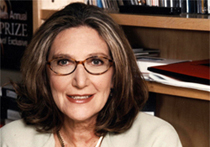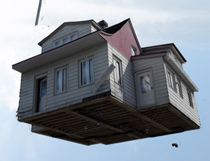A Different Eden
Isme Bennie
My mother always thought of herself as a liberal, a relative term in apartheid South Africa: It did not mean she was at the forefront of the fight against the regime, standing in silent vigil as a member of the Black Sash. She treated our servants better than most, fed and housed them comfortably – all again, relative. We had several servants – Nanny, the cook/housemaid, Simon, the houseboy, Emily the wash-girl, and Daniel, the driver. Nanny had started off as just that – nanny to my sister Pauline, but as they shared a name, to avoid confusion, she was called Nanny while she was in our employ. Almost all white families had a nursemaid for their children, someone who looked after them for most of the day, got them up, dressed, fed, walked, and delivered to the parents on call. Sarah and James were our original house servants. They were Cape Coloured (mulatto) and had come to my parents’ home with my grandmother when she came to live with us. My parents decided to promote Nanny to housemaid when my sister was too old to need one, and Sarah and James were dispatched to Top Location (not the newer Sharpeville). Nanny was Xhosa, religious, while Sarah and James were happy drinkers. Nanny went to church every Thursday afternoon with the rest of the maids, dressed in her churchgoing uniform of black skirt, crisp white blouse with a red sash across it. Thursday afternoon was the universal servants’ time off.
Every day Nanny brought early morning coffee up to our rooms, a South African tradition. Cooking was part of her job description. She wasn’t a great cook, but then we ate pretty routine meals, and it was my mother, like many South African housewives, who did the fancy stuff like baking: chocolate cake, cheesecake, biscuits, and the traditional Jewish dishes at high holiday times. Simon did the rough work, sweeping, polishing, and cleaning the windows. Everything got cleaned every day. And he looked after the garden. Emily came to wash on Mondays, and to iron on Tuesdays, with her baby strapped to her back in a blanket. The laundry room was adjacent to the servants’ quarters at the rear of our “double story†house (most houses in my home town were bungalows in those years). Our servants’ quarters were considered quite luxurious, with electricity and running hot and cold water.
Nanny and Simon lived in, but Daniel lived in Sharpeville. Nanny had two daughters, Tsotsie (little rascal) and Gehlie (Girlie) who lived with her. It was illegal in those days for them to be there, but my parents left it alone, and I don’t think they ever enquired who or where the father was. I don’t remember Tsotsie’s real name. The girls must have gone to school, but other than a memory of my sister and Ghellie playing together as tots in our backyard, the next recollection I have is of Tsotsie being engaged. Nanny had been putting away linen and clothing for her trousseau and this became a heightened activity, as the wedding approached. The wedding was held on a summer’s day in our back yard. My mother said it would be okay for the guests to come inside to use our downstairs washroom!
* Â Â Â Â Â Â Â Â Â Â Â Â Â Â Â Â Â Â Â Â Â Â Â Â Â Â Â Â * Â Â Â Â Â Â Â Â Â Â Â Â Â Â Â Â Â Â Â Â Â Â Â Â Â Â Â Â Â Â Â Â Â Â Â *
We waited a long time after the war for a car, one reason being that it could not be green, considered an unlucky color by my mother. When we finally got our brown Vauxhall, my mother dented it on her first attempt to get it out of the garage, and never drove again. A succession of drivers and brown cars began. Daniel drove us everywhere, when he wasn’t driving for my father’s lumberyard (and later stealing from it, but that’s another story). He took my father to bridge every Sunday afternoon in nearby Johannesburg, my mother to visit relatives there, even took my teenage friends and me to parties and jazz concerts in the city, patiently waiting to drive us home again.
We had two cinemas in our town, the Metro, where my friend Carol’s mother was the cashier, and the Odeon. As young kids we went on Saturday mornings to “bioscope.†Sometimes we played hookie from Hebrew lessons and went on Wednesday afternoons. As teenagers we went on Friday nights. We had a drive-in, and it became a Friday or Saturday night destination once we got drivers’ licenses. Nothing was open on Sundays in those days. My mother of course didn’t drive, but there was a film she badly wanted to see. So she went through a lot of red tape to get permission for her black driver to take her to a whites-only drive-in. After the show she asked Daniel how he had enjoyed the experience. Turned out he’d already seen the film in the township!
* Â Â Â Â Â Â Â Â Â Â Â Â Â Â Â Â Â Â Â Â Â Â Â Â Â * Â Â Â Â Â Â Â Â Â Â Â Â Â Â Â Â Â Â Â Â Â Â Â Â Â Â Â Â Â Â Â Â Â Â Â Â Â *
By this time I had gone to university in Johannesburg, Sharpeville riots happened, and not long after I went to live abroad. My sister Pauline still lives in South Africa. Today, most white South Africans still have help. My sister’s weekly help is Alida. My sister has my mother’s caring nature. She organizes the fixings for Alida’s children’s birthdays, buys the oldest girl jeans and some of the trendier clothes a teenager wants. She helps her with her homework. On hot days she takes cold drinks to the men who man the security gate of her apartment complex. She tips liberally. She bought baby necessities when Alida was pregnant last year. During her maternity leave, Lorna filled in. In December 2009 to be exact, my sister’s apartment was broken into, she was stabbed, strangled and robbed. She has healed physically, and has done remarkably well emotionally, but the scar will be there forever, particularly as there is no closure once the culprits disappear into a huge black hole that is Johannesburg. Does my sister think it was a random attack? Two days before, Lorna had asked her for 2000 Rand. My sister refused. While – relatively speaking – my sister is far better off, she has little discretionary cash and this was an excessive request. She believes the attack was one of revenge.
On the plus side, the incident has brought my sister closer to her children, who have been saddened by the experience and their brush with mortality. We’ve all been personally touched. For me, the afternoon thunderstorms, the smell of the red earth, the magnificent sunsets, the creaking of houses settling down for the night, these things – so much part of the South African consciousness – they have been overtaken by a new and ever-present reality.





Wonderfully vivid memories, honestly told.